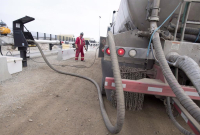Support strong Canadian climate journalism for 2025
When I told people I was heading to northeastern British Columbia to check out fracking sites, the most common response was: “We do that here?”
Few southerners have any idea what goes on in the Peace region, and even fewer will ever see it for themselves. For all the hype about liquefied natural gas (LNG) the last few years, not many of us seem to know where it all comes from.
One thing I can tell you is if fracking was going on in Vancouver or Toronto, people would’ve put a stop to it ages ago. After visiting local communities near Dawson Creek, B.C., it’s hard to believe their story has not been told.
Flying over the countryside is the only way to fully grasp the scale. Fracking infrastructure blankets the region from the Alberta border to the Rocky Mountains. Gas plants, compressor stations, well pads, flare stacks, pipelines, wastewater ponds — it just goes on and on and on. I was horrified at just how much farmland and wilderness have been lost to fracking infrastructure.
Folks on the ground told me stories of their lives turned upside-down. I’ve had my share of bad neighbours before, but these fracking companies take the cake. Constant industrial noise from machinery, bright orange flames above flare stacks lighting up the horizon, the smell of poisonous gas prompting abrupt evacuations — and everywhere residents are afraid to speak out.
Long-term effects are even more worrisome. Little research has been done on the cumulative health impacts of fracking in the region, but doctors report bizarre incidences of rare cancers and scarring of the lungs with no clear cause. One community health researcher found evidence of benzene contamination in people. Benzene, a known carcinogen, was found to be 3.5 times higher in pregnant women who lived close to fracking sites and six times higher if those women were Indigenous.
Earlier this spring, drought conditions linked to warming temperatures forced the BC Oil and Gas Commission to suspend water withdrawals for fracking companies in the northeast. These operations use an astonishing 550,000 water trucks worth of the dwindling resource each year. Much of that water eventually ends up deep underground, leaving local wetlands and rivers running dry and the land parched.
While the industry is already suffering from climate change, it continues to make the problem worse. Methane leaks from fracking operations are the key contributor to an alarming spike in levels of the highly potent greenhouse gas in the atmosphere. And all it takes is one look at the mammoth flare stacks dotting the horizon in the Peace region to see for yourself the damage fracking does to the climate.
And all of this is about to get worse. Three LNG projects in Squamish and Kitimat would require over 13,000 new fracking wells over the next 30 years between them. While industry and government tout this new fossil fuel industry as the “cleanest LNG in the world” there’s little talk of the explosion in fracking operations it would bring. We know the only path to limiting global warming to safe levels is zero-carbon renewable energy, not fracked gas.
Fracking infrastructure is transforming rural communities into industrial wastelands. It leaves residents afraid for their families. Gas companies bully and intimidate anyone who raises concerns, to the point where almost everyone we’ve interviewed did not want to be shown. An ominous air always follows me on my visits up north — almost a mafia-style cone of silence imposed on local residents. It’s time for the rest of us to start paying attention before it’s too late.
Peter McCartney is the climate campaigner for the Wilderness Committee.







Comments
Pictures and maps of the fracking would have a greater impact on public awareness in the extent of the fracking. This would be a great service if the National Observer could arrange some.
Auto fill put the word aerobics where I typed "service". !!!!!!
Well, there's this: http://www.ratcliff.com/news/blueberry-river-first-nations-file-claim-c…
Thanks for commenting on this, Dave! I've changed that word in your comment
There's lots of money being invested in poisoning our world. Just think of the progress we could make if we put that money into transitioning to clean energy.
Fracking and the great Koch brothers. People should read an unbiased information article about fracking and what its hazards are. This is capitalism at its finest, Not! I know someone who worked in that area for a gas company. He was fired because he forgot his cellphone in his knapsack. They obviously don’t want pictures taken so there must be something to hide. So many people are very ignorant or have very limited understanding. I was told by gas station attendant that they no longer call the fire detachment for gasoline spills because it evaporates rapidly and thus is ‘gone’. He obviously missed the science class when the three states of matter were explained: solid, liquid and gas. Just because gasoline evaporates doesn’t mean it and it’s hazard are gone. It has simply changed from a liquid into a gas. Soon there will not be a planet left for our children and grandchildren to enjoy. Please, everyone, stop being so shortsighted.
The desperation of the oil/gas industry to sustain its profits is so painfuly obvious everyone who consumes their products should be hunting for ways to avoid further enriching them! Until the poisonous extraction process known as "fracking" can be made safe from its contamination of our non renewable "potable" water resources it must be stopped. We seem to have accepted that access to "cheap" fossil fuel energy is more important that access to life sustaining clean water.
@Dave You can check out photos from the trip on our Wilderness Committee Facebook page!